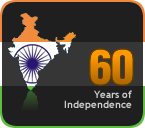It was with great interest I read my cousin’s blog, Inlaws and Outlaws . I have always thought that women themselves are their worst enemies A mother- in- law and her daughter- in-law fighting for and trying to hold onto the son’s/husband’s affections are the worst type. As my cousin has rightly said this in-law fight has been going on for ages and will go on for ever.
Even at this time and age in educated families many arranged marriages take place in which the boy and the girl are given the freedom only to nod yes to what the elders say. A few years or months hence ,the girls in-laws particularly the mother would not be able to digest the fact that the couple are happy with each other and are getting to love one another. The mother has this fear that her son‘s love for her would be lost for ever But it is ridiculous when one thinks about it in a dispassionate way. The mother should always remember that she has reached where she is now by walking down the same road. If this woman had a tough time with her mother-in-law in her time all the more reason why she should be kind and considerate and caring towards her son’s wife and treat her like her own daughter --- not as her enemy.
In some families, this theory does not work. This seems to have a reverse effect as in the case of Sethu and Janani. Sethu and myself came to Delhi as young brides at the same time, in the 1940s. Sethu and her husband started their married life staying with his parents while my husband and myself were on our own. Sethu had a very tough time with her mother-in-law. She had no freedom in anything in the house. She could not even talk with her husband in the presence of her mother-in-law. Could not even buy what she wanted, could not eat what she liked. As days passed her mother-in-law started choosing sarees for her, which according to Sethu, were not at all to her liking. She was not allowed to go out either for shopping or for walks like we did. When a son was born to Sethu, it was again her mother-in-law who decided how the baby was to be brought up or how to be fed and how to be dressed. She was not able to oppose her mother-in-law because her husband did not find anything wrong in this.
Poor Sethu. Whenever we met she used to cry on our shoulders, promising that she the way she would treat her daughter-in-law would be very different. Yes, things worked out differently for her when her son got married. Janani, a working girl, was so different from what she expected. Of course, she was very well mannered with Sethu but she drew the line for her mother-in-law, a Lakshman Rekha, which Sethu was not supposed to cross. Janani having her own ideas of how to run her house and her married life was very independent with her views. She never allowed her mother-in-law or her father-in-law to interfere with her style of running the house. She redecorated the house to her likes and had her own way of cooking also. Why she went to that extent that she chose the sarees Sethu had to wear, saying only such colours would suit her. Poor Sethu was caught in the web. Now she had to dance to her daughter-in-law’s tune and again needed our old shoulders to support her.
YES, there was a generation of women who in the beginning had to give in to the upper hand of their mothers-in-law and later on in life to dance to the tunes of the daughters-in-law if there was to be peace in the house.
In the olden days it was an unwritten law that a woman in her young days had to obey her father (see not her parent, here also the mother had no voice); later on, her husband with his favourite all-time words -- you don’t know anything; and, in her old age, her son. So when her son got married and brought home his bride, the mother-in-law found an easy target to vent her anger and frustrations; treating her like a slave, all the time finding fault with whatever she did. She had no kind word or not even a single word of praise for the poor girl however hard she tried to please her mother-in-law.
As women started getting educated, the situation began changing. Some girls, when they got married, were smart enough to make their mothers-in-law realize that it would benefit both of them if they had separate establishments. Others, taking education as a weapon, fought against everyone in her husband’s family asking questions as to the why and how of things for which She herself was not able to give the correct answers. But with her attitude she was able to make everyone in her family miserable.
The menfolk -- I mean the newly-married ones -- are also to be blamed. I remember as I am writing this a friend of ours. He, as a bachelor, was staying in one of the chummeries of Lodhi Colony, enjoying the meals cooked by either by one Raman Nair or one Krishnan Kutty without any complaint however average or unpalatable their fares were. After five-six years of this kind of life, he got married and brought his bride to Delhi. This young girl tried her best to please her man by trying to cook to his taste. Our friend started comparing her cooking to his mother’s, which he never even thought of while eating at Raman Nair’s or at Krishnan Kutty’s. This put off the young bride and all her anger turned towards her mother-in-law who was living hundreds of miles away from Delhi
In a joint family, one word of praise from the man of the house about the new daughter-in-law’s cooking is enough to upset the mother-in-law causing a rift between them. After all a mother-in-law and a daughter-in-law are also human beings. What they should remember is that a man’s feelings for his mother are very different from his love for his wife.
A woman may know how to rule the country. But that rule may not extend to their daughters- in-law. Think of Queen Elizabeth and princess Diana or nearer home take our own Indira Gandhi and Maneka Gandhi. It is the same story.
Friday, January 8, 2010
Subscribe to:
Comments (Atom)




